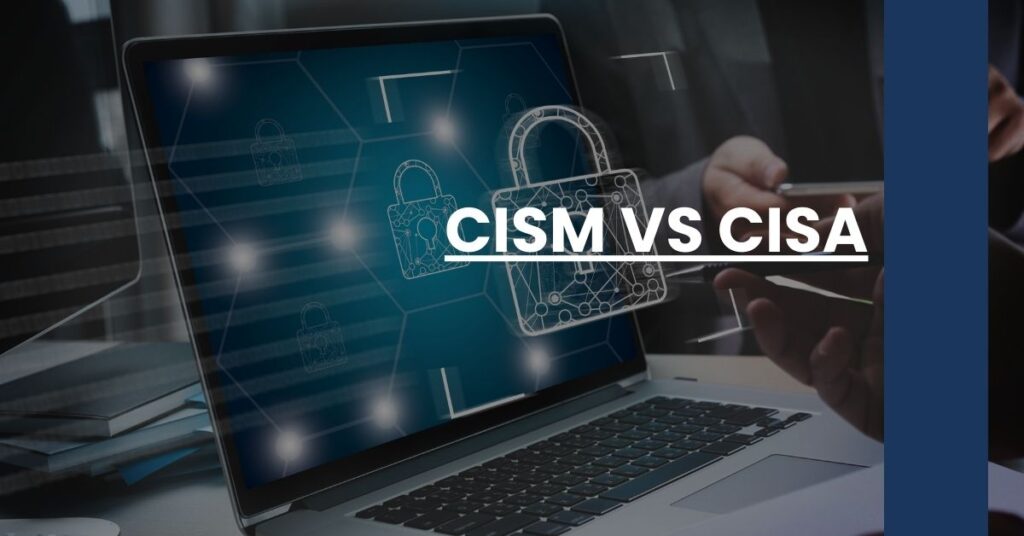Deciding between a CISM and CISA certification is pivotal for IT governance professionals looking to specialize and advance their careers. Both credentials bolster your IT audit and security skills, but their focus differs.
- For a strategic leadership role in information security management, CISM is your go-to certification.
- If you’re inclined towards auditing, control, and assurance environments, then CISA aligns with your career path.
In this piece, you’ll uncover the distinct career prospects that each certification offers and the examination criteria required. This framework will equip you to make an informed decision tailored to your professional aspirations.
Understanding the CISM Certification
The Certified Information Security Manager (CISM) certification is a globally recognized standard of achievement that primarily gears itself towards experienced information security managers and those with infosec responsibilities. If you’re pursuing a pathway where you will design, manage, and oversee an enterprise’s information security, then CISM can be your badge of professional excellence.
This in-depth certification places a strong emphasis on information risk management, a critical aspect for organizations looking to safeguard sensitive data. Here are the core areas you would delve into with CISM:
- Information Security Governance: Designing and establishing an organization’s security strategies aligned with business goals and risk.
- Information Risk Management: Identifying and managing risks to ensure business objectives are achieved.
- Information Security Program Development and Management: Establishing and managing the information security program to support the strategy and reduce information risk.
- Information Security Incident Management: Planning, establishing, and managing the capability to detect, investigate, respond to, and recover from information security incidents.
What sets CISM apart is its strategic approach. It helps you understand the broader business goals of information security, preparing you for high-level consultancy and policy-setting roles. If you are looking to advance into a position where information security strategy aligns with business objectives, CISM certification could be the perfect step forward.
Exploring the CISA Certification
If you see yourself thriving in the world of audit and assurance, the Certified Information Systems Auditor (CISA) certification is tailored for you. Technically, it’s one of the most sought-after certifications for professionals looking to showcase their information systems audit skills, with an added emphasis on the governance and compliance aspects of business IT.
Areas covered under CISA include:
- Information Systems Auditing Process: Executing a risk-based IS audit strategy in compliance with audit standards.
- Governance and Management of IT: Ensure the organization’s information systems strategy is in line with its goals.
- Information Systems Acquisition, Development, and Implementation: Analyze the risks associated with the acquisition and deployment of IS.
- Information Systems Operations and Business Resilience: Oversee the operations and procedures to support the integrity and resilience of information systems.
- Protection of Information Assets: Safeguarding and securing the organization’s information assets.
Specializing in CISA means diving deep into the nuances of IT auditing. It’s about becoming a key player in an organization’s audit department, a guardian of standards, controls, processes, and capabilities. With CISA certification, you’re not just monitoring the IT landscape—you’re ensuring it aligns with core business strategies and delivers value.
Key Focus Areas: CISM and CISA Compared
When you’re weighing the options between CISM and CISA, understanding their focus areas is crucial. While both are cornerstones of information technology governance and security, they serve different professional purposes and domains.
CISM is about Security Management, with a key focus on:
- Strategically aligning security programs with business goals.
- Risk management principles and practices.
- Developing and managing holistic security policies.
CISA revolves around Systems Auditing, targeting:
- Auditing, control, and assurance of information systems.
- Governance and management of IT.
- The acquisition, development, and implementation of information systems.
There’s some overlap in areas like understanding and protecting information assets, incident management, and risk assessment. But they part ways in the specificity of their application; CISA dives deeper into the auditing process, while CISM is broader in security policy and strategy.
Their convergence points include a shared dedication to maintaining high standards in IS governance, highlighting the importance of both auditing and security management in a robust IT strategy. Each plays a distinct, yet complementary, role in the grand scheme of information technology integrity and efficacy.
If you’re leaning toward a leadership role where you’ll have significant sway over an organization’s security destiny, CISM’s strategic stance could be your guiding star. Conversely, if you envisage yourself in the trenches of system processes, scrutinizing and safeguarding against divergence from best practices, CISA’s detail-oriented discipline might be your calling.
But remember, the journey doesn’t end with understanding the certifications themselves. Next, you’ll want to dive into the career implications of each choice to see which certification aligns best with your envisioned future.
Career Pathways and Opportunities
When it comes to career pathways, CISM and CISA lead down different yet equally prestigious roads. Your decision between the two could set the stage for the professional roles you aspire to excel in.
For CISM certified professionals, the trajectory often points towards leadership roles in information security. A CISM designation is highly revered in positions such as:
- Chief Information Security Officer
- Information Security Manager
- Security Consultant or Analyst
- Information Risk Compliance Specialist
In each of these roles, your ability to align security programs with business objectives and manage the nuanced dance of risk versus reward will be invaluable. If leading and designing security strategies at a high level resonates with you, CISM is a powerful ally on your resume.
On the flip side, CISA certified individuals often find themselves in crucial audit-oriented roles within an organization. Job titles commonly associated with CISA include:
- Information Systems Auditor
- IT Audit Manager
- Internal Control Auditor
- IT Risk and Assurance Manager
As a CISA cert holder, your expertise in scrutinizing and governing the lifecycle of IT systems will be your trademark. The certification positions you as a safeguard against misalignment and inefficiency, as you ensure compliance and controls are up to snuff. For those who enjoy digging into the details and ensuring every checkbox is ticked, CISA is the key that opens the door.
Moving forward, let’s dissect the exams and certifications to underline what you’re committing to and the process of obtaining either the CISM or CISA credentials.
Exam and Certification Requirements
The journey to CISM or CISA certification is rigorous, but the rewards are commensurate with the challenge. Both certifications have stringent prerequisites and demand a fair degree of dedication.
The CISM examination includes 200 questions over a 4-hour period, focusing on the four core functional areas of information security management. To become certified, you must also provide evidence of five years of experience in the field of information security, with at least three years in three or more of the CISM job practice areas.
Similarly, the CISA exam consists of 150 questions to be completed in a 4-hour timeframe, testing five major areas that align with the IS audit, control, and assurance functions. For CISA, you are also required to demonstrate five years of professional experience in information systems auditing, control, or security.
Adhering to the continuing education requirements will keep your certification active. For CISM, this means adhering to the Code of Ethics, partaking in continuing education, and maintaining an adequate level of knowledge and proficiency in the field of information security management. As for CISA, the process involves complying with ISACA’s professional ethics, submitting an annual maintenance fee, and fulfilling at least 20 hours of continuing professional education annually, among others.
Deciding whether to pursue CISM or CISA will demand a self-audit of your career goals, current skill set, and where you get your professional satisfaction. Once you’ve decided to take the plunge, starting your exam preparation becomes your next critical mission.
Which Certification Should You Pursue?
Your career trajectory should heavily influence whether you decide to go for CISM or CISA. Ask yourself where you see your career in the next five years. Do you find yourself envisioning a future where you’re navigating a company through complex security landscapes (a tale that CISM supports)? Or do you see yourself as the person who ensures the soundness, compliance, and thorough auditing of these same systems (a narrative where CISA reigns)?
For those aiming to penetrate the world of security program leadership, driving policies, and crafting security strategies, CISM has likely attracted your attention. On the other hand, professionals who derive satisfaction from meticulous risk assessment, control evaluation, and auditing may feel a magnetic pull towards CISA’s specialty.
Both pathways promise a rich and fulfilling career with plenty of room for advancement. Remember, in the evolving landscape of IT governance, both CISM and CISA maintain their significance, and the demand for skilled professionals in these domains shows no signs of waning.
Conclusion: Balancing the Prospects of CISM and CISA
In sifting through the granular details and prominent features of the CISM and CISA certifications, you now stand at the crossroads with clarity to make that crucial career-defining choice. The CISM vs CISA debate doesn’t imply a winner or loser but a directional sign pointing you toward the pathway that best suits your career aspirations and skills.
These certifications are more than accolades; they are career catalysts offering you different lenses through which to view and shape the realms of IT governance and security. Whether you’re riding the waves of risk management and strategy or diving into the depths of inspection and compliance, your chosen certification will arm you with essential tools to not only succeed but to excel.
Envision your future and remember that whether you choose the strategic posture of CISM or the detail-oriented nature of CISA, neither path is set in stone. The world of IT governance is vast and interconnected, and there’s always room for growth, exploration, and even the pursuit of dual certification down the line. Choose the certification that gels with your vision, and prepare to embark on an impactful, challenging, and rewarding journey ahead.

